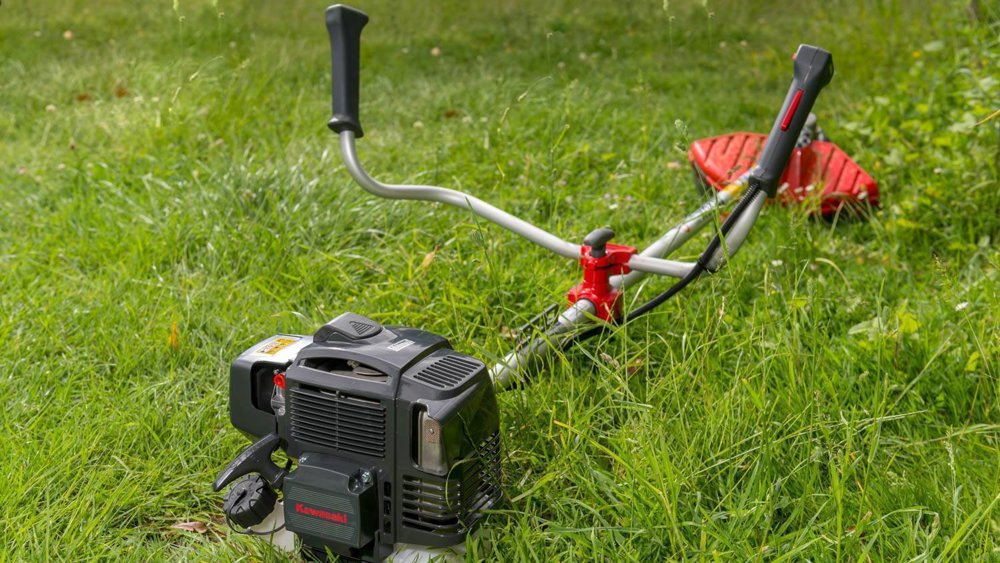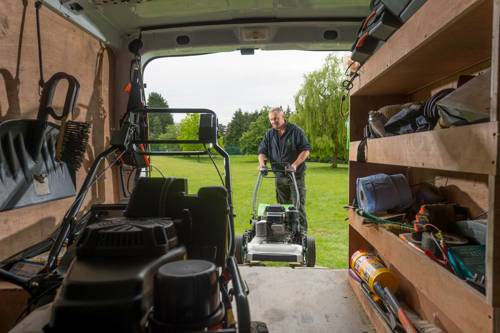How to protect landscaping tools from theft
5 Dez. 2022 Small Business Advice
When your business relies on valuable equipment to run, it's natural to be worried about theft. The cost of living crisis, which is an issue across Europe, has only heightened these concerns.
History has shown that any economic downturn brings with it an increase in crime, and valuable property like landscaping equipment is unfortunately a frequent target. Tool theft is debilitating for a landscaping business, with the cost of replacing tools high, and searching for new ones time-consuming. The majority in the industry are also self employed, meaning any significant downtime can have a huge impact on the survival of a business.
Landscaping equipment theft is a problem that can seriously impact – or destroy – a business. Taking every step you can to protect landscaping tools from theft and having a contingency plan if the worst occurs is essential.
We've gathered a handful of tips and advice to help protect your tools, and therefore your business.
First Step? Get insured
Increased crime might be one effect of a cost of living crisis, but cutting expenses is another for anyone in business. Insurance might seem like one of those unnecessary expenses when costs are rising, but not being properly insured is a huge risk to take.
There were stories in the heatwave of 2022 of people not having home insurance when fires destroyed their homes; those people most likely thought their homes would never burn down, but unfortunately we never know what the future holds.
Just like those who lost their homes, if your equipment is stolen you could lose your business. Replacing equipment is an expense many landscaping businesses are unable to afford, and the downtime until you purchase new tools only adds to the total cost.
Getting insurance to cover your equipment can feel like wasted money, but you'll be immensely relieved you have it if you ever need to deal with stolen items.
Choose the right insurance policy
Many insurance policies will have clauses that might prevent you from claiming; check that your insurance policy is designed for tradespeople, and that all of your equipment is covered.
Be careful to see if the policy covers certain scenarios – for instance, if your tools are left in your van overnight and are stolen from there, some policies won't cover the cost.
Keep records of your equipment
Keeping records of your equipment won't help with theft prevention, but you'll be glad you've made the effort if anything is stolen as it will make it much easier to make a claim on your insurance.
Noting down the serial numbers of your equipment is essential. Serial numbers denote exactly who a tool belongs to, making it simpler if you need to prove to the police an item is yours.
8 ways to protect landscaping equipment
While it's essential to insure your tools to protect your business, as no anti-theft method is completely foolproof, there are a few things you can do to deter potential thieves.
The following tips help with theft prevention, ensuring your business is not an easy target.

Use GPS tracking devices
Attach a GPS tracker to your equipment for peace of mind; if any equipment is stolen, you'll be able to track its location. Having one on your van is a worthy consideration, too.
These trackers are no longer prohibitively expensive and will be invaluable if you need to track any stolen property. Whether you want to track all of your small equipment or just the larger, most valuable pieces, it's well worth taking the time to install trackers on your tools.
Secure your van
Tools can be stolen while you're on site, or when they're in storage, but frequently they're taken straight from the van. Criminals know that vans – whether it's advertised with a business logo or not – are usually owned by tradespeople and are likely to have valuable tools inside.
If you secure your van and make access difficult, you won't be an easy target. There are a handful of steps you can take to prevent a break in and keep your tools safe:
- Steering wheel locks are especially worthwhile when you're likely to be stopping in one place for a lengthy period.
- Upgrade your vehicles' locks to make it harder for thieves to break in. Limpet locks are a far trickier obstacle for thieves than any in-built lock system in vehicles.
- When walking back and forth from your van on site it's easy to forget to lock the doors. It seems like an obvious point, but many have items stolen because they've simply forgotten to lock up.
- Install a dash cam and advertise the fact you have one with a sticker as a deterrent.
- If you have a trailer hitch locks will make it difficult to tow.
- You could place small equipment in a tool safe.
Upgrade your security system
Upgrading to a more advanced security system, both at home (or wherever you keep the tools overnight) and, as we've previously discussed, for the van, is vital for preventing tool theft.
Video doorbells for homes are incredibly popular - and for good reason! Making sure you protect where you store your tools like you would your home, with an advanced lock and alarm system and CCTV, is a logical step.
You should make the cameras as visible as possible and have prominent stickers warning people they're being watched.
Avoid leaving equipment in the van overnight
Leaving high value tools inside a van overnight leaves you especially vulnerable to thieves. You should store equipment inside a secure place like a garage overnight, which will be far safer than leaving it in the van.
If you have to leave your van with tools in it overnight, make sure your insurance policy covers this and try to make it difficult to access the van. Steering wheel locks, a limpet lock; as previously mentioned, there are several ways you can make your van more secure.
Don't leave equipment unattended on-site
This may seem obvious, but when you're busy at work it's easy to forget to secure equipment while you quickly see to something else. Tools left unattended, even for a short time, are vulnerable to theft.
Theft is often a crime of opportunity, so keeping tools safe and out of sight will help you avoid any such incidents. Putting equipment back in the van and locking it – especially handheld equipment, which is easiest to forget – unsurprisingly reduces the risk of equipment being stolen. It's best to leave the van itself in well lit areas, but just locking equipment away instead of leaving it sitting against a fence on site will help!
Mark your equipment
As well as noting down serial numbers, marking your equipment is a great way to identify a tool as yours. If the ownership of your property is contested, which may happen if it's confiscated by police, a marker will make it easier for you to prove.
There are several ways you can mark your tools, but engraving is a popular choice. It's a permanent marker that can't be easily removed; paint is also commonly used and low cost, but isn't quite as infallible.
Leave some equipment at home
Plan your days well and you'll know exactly which pieces of equipment you'll need. There are very few jobs which will require all of your equipment to be used; if you can leave some in a secure location at home, it minimises the risk of losing all your tools at once.
Consider re-keying
While this may not be an option for all mowers, re-keying your most valuable equipment might soothe some of your worries. Many mowers can be started with a universal key, which makes it easier for thieves to steal; re-keying would make it a far more difficult task.
Winter storage safety tips
Our tips so far have been focused on equipment that is regularly in use, but what can you do to protect equipment in storage?
Landscaping equipment will be kept in storage for months over winter – while you've probably taken steps already to secure your tools, there are a few extra measures you should consider:
- Wheel locks can make your large equipment like lawn tractors and mowers harder to steal.
- You could remove the batteries for electric versions of hand tools, making them inoperable.
- Attaching equipment to a ground anchor will give you extra security.
- Install CCTV.
Placing your tools in storage for winter raises other considerations besides theft prevention. For tips on how best to store your equipment over winter, read our advice on winter pre-storage preparation.
Keeping your equipment safe
Though nothing can guarantee theft prevention, by following these tips you're in a better position to protect your tools than most, and have a stronger case when claiming on an insurance policy.
Remember, this advice will help you avoid the worst-case scenario, but insurance is still vital for your business. Taking these steps in combination with having insurance is the best way to keep your tools safe.
You may be interested in
-
Wie man trotz Fachkräftemangels Arbeitskräfte für den GaLaBau gewinnt

-
How to avoid business owner burnout

-
Social media post ideas for your landscaping business

-
Wie man seinen Landschaftspflegebetrieb mit gelungenen Fotos und Videos von seiner Arbeit in Szene setzt

-
Ein Leben als Landschaftsgestalter – Überlegungen zur Gesundheit von Körper und Geist

-
Unverzichtbare Werkzeuge für Landschaftspfleger







